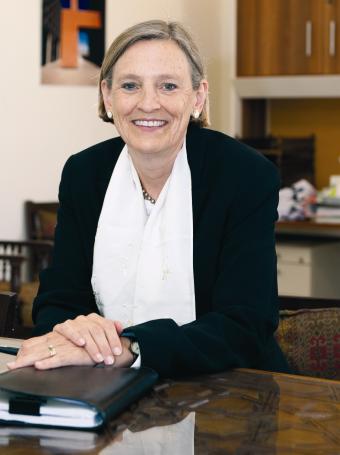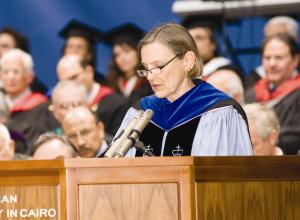 |
Provost Lisa Anderson
envisions
AUC as an
international
center
of excellence
By Dalia Al Nimr
Photos by Ahmad El-Nemr
As AUC’s provost, Lisa Anderson is on a mission. Her goal is to make the university widely known, not just in Egypt and the region, but around the globe. “The world of higher education will become tightly networked in the next 10 years, and there will be around 100 really well-known universities around the world. I believe AUC can be one of those,” said Provost Anderson.
A specialist on politics in the Middle East and Africa, Anderson is former dean of the School of International and Public Affairs at Columbia University, where she also served as professor of international relations, chair of the political science department and director of the Middle East Institute. She joined AUC at a time of transition, when the university relocated to New Cairo. While some may balk at the challenges such a move presents, particularly in her first year as provost, Anderson was excited about the prospects.
“I am delighted to have joined the university at such a fabulous moment in its history,” she said. “AUC can now do things that it never
dreamt of on seven acres in Tahrir;
the opportunities are endless.” |
|
Anderson developed an affinity with Egypt and the region in college, when one research paper altered the course of her career. “I went to university thinking I want to be a civil rights lawyer, changing the world and having an impact on everything around me,” she said. However, during her sophomore year, in a class titled Politics and Culture in World Affairs, her teacher assigned her a paper on Egypt. Anderson knew nothing about the country, but researched it well and ended up writing 80 pages, from the time of Mohammed Ali to Gamal Abdul Nasser. “My teacher thought it was a good paper, and I told myself I will keep doing this until I get bored. In fact, I have been fascinated ever since,” she said.
The experience also propelled Anderson to become a professor herself. “I realized that teachers can change the world, one person at a time,” she noted. “They open windows that we didn’t know existed, and that’s what happened with me.”
Anderson went on to earn her master’s in law and diplomacy from the Fletcher School at Tufts University and a doctorate in political science from Columbia University. During that time, she also joined AUC’s Center for Arabic Study Abroad (CASA), accompanied by her husband at the end of her stay. “I’m not a good advertisement for CASA,” she said with a smile, referring to her weakness in spoken Arabic, “but my husband and I loved Cairo, which reminded us of New York.”
 Consequently, when Anderson got a chance to return to Cairo Consequently, when Anderson got a chance to return to Cairo
years later as AUC provost, she didn’t hesitate. Not only is the
city a fertile research ground for a political scientist, the sense of hospitality continues to draw her in. “I have never gone anywhere here where I haven’t felt completely comfortable and at ease, and
I see my position as a way to reciprocate that,” she explained. “As provost, I have the opportunity to play a positive role in improving the quality of higher education here and to give voice
in the
United States to the aspirations of people in the region.”
In her role as provost, Anderson is responsible for shaping and implementing the university’s academic vision and building the size and quality of its faculty. Amidst a global economic recession, a surge of international universities in Egypt
and the Arab world,
and the
university’s historic move, the
challenges are enormous, and
so are
the opportunities. Anderson’s vision is to enhance
AUC’s
visibility worldwide through investing in faculty, promoting their research and revamping some of the university’s academic programs. And she has already taken steps in that direction.
For starters, beginning with the newly established School of Business, the university has embarked on a restructuring of the academic administration to provide more managerial autonomy and budgetary responsibility to the individual schools across campus. In addition, over the next few years, the university will expand the research portfolio and curricular offerings at its new School of Public Affairs.
“This is an exciting time at AUC, as the new campus encourages us to be bold and imaginative in envisioning how we will contribute to creating more just, peaceful and prosperous lives for the people and communities of our world –– now and in the future," Anderson said.
In addition, in an effort to build on the university’s location, Anderson aims to develop the curriculum in innovative ways, the first of which is establishing a series of courses designed around Cairo. These include courses on the city and its link to modern literature, to construction engineering, to the Arab League, as well as to local and regional politics. “The aim is to use Cairo as a field site across the curriculum in a thematically consistent and systematic way and to integrate it into the teaching as much as possible. This gives us a new vantage point to make use of the rich and valuable resource at our disposal –– Cairo,” Anderson explained, noting that, like Columbia,AUC faculty and students are immersed in their communities.
Other areas Anderson wishes to develop are forging institutional partnerships and enhancing collaborative research with top universities worldwide, as well as promoting interdisciplinary training and dual-degree programs at AUC –– something she was successful with at Columbia. “AUC is perfect for such collaborations and scholarly exchange,” she said. In recent years, the university has established partnerships with top-ranking educational institutions around the world, including Harvard and Cornell universities, MIT, Oxford University and the University of Cambridge. It also signed a research agreement with the King Abdullah University of Science and Technology, a world-class graduate-level research university in Saudi Arabia. “It is easy to get parochial and inward looking, but it’s much more instructive and fruitful to have partnerships where learning is reciprocal,” Anderson noted.
With the enhancement of faculty recruitment and development, a new set of academic programs coming into focus, partnerships with other universities flourishing and an increase in scholarships that brings a diverse group of students to campus, AUC is set to be a world-class university in the next decade or two. “There aren’t many competitors to achieving this status, and AUC is unique in that respect,” Anderson affirmed. “Cairo is a world-class city, and there is a wealth of talent to draw from in Egypt.”
|
|